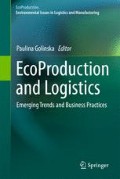Abstract
Production efficiency is one of the most important problems for modern management, both at operational and strategic levels. Raising the level of production efficiency can be achieved in many ways. Ecological aspect is very often undervalued and even missed by the managers of a company, especially when they are small or medium sized. It needs to be mentioned that there is growing interest in environmental aspects not only in production companies or whole supply chains but also in policies of many countries in the world. The aim of this paper is to highlight the importance of environmental problem in production management and to propose indicators to assess the efficiency in eco-friendly production.
Access this chapter
Tax calculation will be finalised at checkout
Purchases are for personal use only
References
APICS Dictionary (2004) 11th Edition American Production and Inventory Control Society, Inc. Falls Church
Corbett T (1998) Throughput accounting. North River Press, New York
Dolinski D, Kolinski A (2011) Estimation of suppliers as an important element of the rationalization of supply processes—case study. LogForum 7(2, no3):26–35
Golinska P (2010a), From traditional non-sustainable production to closed loop manufacturing: challenges for materials management based on PPC and EMIS integration. In: Teuteberg F, Marx Gomez J (eds) Corporate environmental management information systems: advancements and trends, Hershey, New York, pp 106–120
Golinska P (2010b) Sustainable supply chain management—challenges for integration of distributed data sources. In: Grzybowska K (ed) New insights into supply chain, Publishing House of Poznan University of Technology, Poznan, pp 149–157
Goldratt EM, Cox J (2004) The goal: a process of ongoing improvement. North River Press, Massachusetts
Kaplan RS, Norton D (1996) The balanced scorecard: translating strategy into action. Harvard Business Press, Harvard
Kolinski A (2010) Diversification of production—innovative tool for controlling. In: Fertsch M. (ed) Innovative and intelligent manufacturing systems, Publishing House of Poznan University of Technology, Poznan, pp 241–250
Kolinski A, Fajfer P (2011) ERP integration as a support for logistics controlling in supply chain. In: Golinska P, Fertsch M, Marx-Gomez J (eds) Information technologies in environmental engineering—new trends and challenges, ESE. Springer, Berlin , pp 617–626
Michelsen O, Fet A, Dahlsrud A. (2006) Eco-efficiency in extended supply chains: a case study of furniture production. J Environ Manage 79(3):290–297
Quariguasi J, Walther G, Bloemhof J, van Nunen J.A.E.E, Spengler T (2009) A methodology for assessing eco-efficiency in logistics networks. Eur J Operational Res 19(33):670–682
Sehgal S, Sahay BS, Goyal SK (2006) Reengineering the supply chain in a paint company. International Journal of Productivity and Performance Management 55(8):655–670
Sliwczynski B (2011), Operational controlling—a tool of translating strategy into action. Log Forum 7(1, No 5):45–59
Twarog J (2005) Measuring and indicators of logistics. Publishing House of Institute of Logistics and Warehousing, Poznan (in Polish)
Verfaillie HA, Bidwell R (2000) Measuring eco-efficiency—a guide to reporting company performance. World Business Council for Sustainable Development
Waters D (2002) Operations management: producing goods and services. Pearson Education, London
Author information
Authors and Affiliations
Corresponding author
Editor information
Editors and Affiliations
Rights and permissions
Copyright information
© 2013 Springer-Verlag Berlin Heidelberg
About this chapter
Cite this chapter
Kolinski, A. (2013). The Role of Production Efficiency Regarding Ecological Aspects. In: Golinska, P. (eds) EcoProduction and Logistics. EcoProduction. Springer, Berlin, Heidelberg. https://doi.org/10.1007/978-3-642-23553-5_6
Download citation
DOI: https://doi.org/10.1007/978-3-642-23553-5_6
Published:
Publisher Name: Springer, Berlin, Heidelberg
Print ISBN: 978-3-642-23552-8
Online ISBN: 978-3-642-23553-5
eBook Packages: Earth and Environmental ScienceEarth and Environmental Science (R0)

